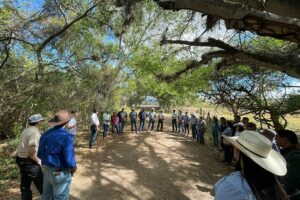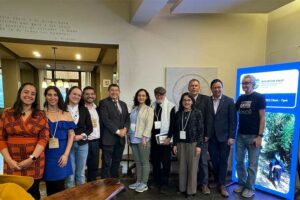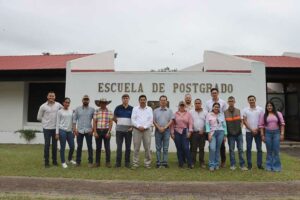Jalisco and Chiapas exchange experiences on sustainable livestock and dairy processing
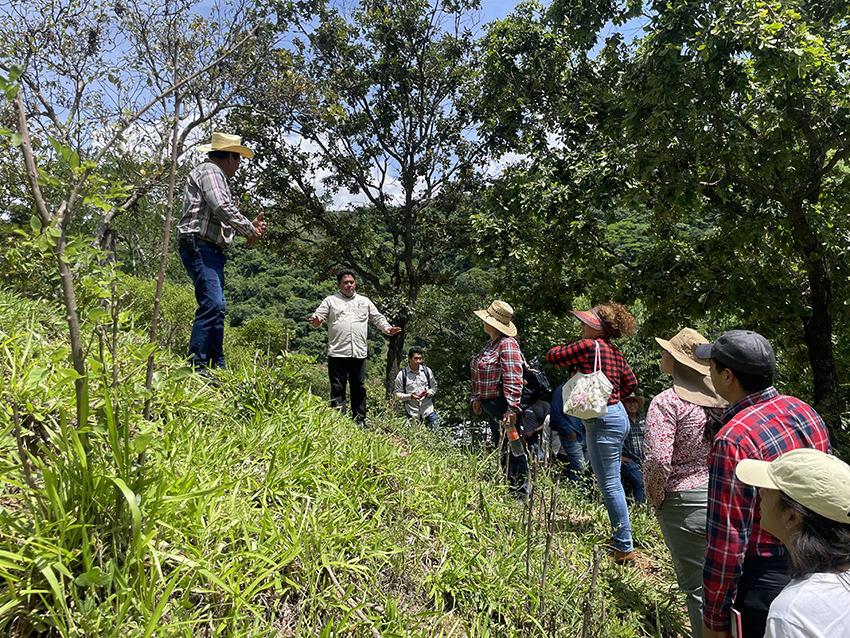
- The exchange took place within the framework of the BioPaSOS project, implemented by CATIE..
July 19, 2022. In order to strengthen capacities in the area of sustainable livestock and dairy product processing through good livestock practices and silvo-pastoral systems, livestock producers, technicians and authorities from the Sierra de Amula, Southeast, South Coast and West Coast-Sierra regions of the state of Jalisco, Mexico, participated in an exchange of experiences with livestock producers from the municipality of Villaflores, in Chiapas, from July 11 to 13.
The exchange was hosted by producer families belonging to the Biodiversity and Sustainable Agro-silvopastoral Livestock Landscapes project, known as BioPaSOS, and members of the Los Angeles Silvo-pastoral Farm Schools and partners of Los Angeles Quesos, as well as members of the Ricardo Flores Magón Ejido Farm School and the owner of the Los Flamboyanes ranch in Villaflores, Chiapas.
As part of the exchange, a field tour was made through the different plots and pastures of the Chiapas producer families, in order to share the good livestock practices they carry out on their farms, such as forage banks, live fences, protein banks, multi-nutritional blocks, pasture rotation, vaccination schedules, clean milking, biodigesters and the process of making the different types of traditional cheeses of the state of Chiapas, which have recently been booming in marketing throughout Mexico.
Josefina Rosas, a livestock producer from the southern coastal region of Jalisco, said the exchange exceeded all her expectations. "I went with all my heart, willing to learn because I wanted to learn more about sustainable livestock farming and silvo-pastoral systems. I learned a lot about the dairies they have and the good practices they carry out both in the pasture and in the cheese-making processes. The Chiapas cattle producers work in an associated way to produce cheese and market it locally and in different points of sale in the country, they were very good people because they shared with us the production processes, experiences and complications they had to face as a cooperative, we saw that their silvo-pastoral practices are very well established and I consider that they are very advanced. I will be sharing this experience with my family and colleagues from the Farmer School to which I belong in the municipality of La Huerta, in Jalisco, because the land and the breeds that are managed in Chiapas are similar to our production areas. What I learned is for life," said Rosas
In addition, Hugo Ramón, a producer from the Buen Rostro area of Jalisco, said that it was interesting to see how the Chiapas cattle ranchers do a lot with the little they have. "The interesting thing has been the way they have managed their cattle in terms of feeding, genetics, grazing systems, etc., as well as the way they have been growing in an associated manner, which we know is complicated. However, they have succeeded thanks to the support they have received from different institutions in the state, and for me, the way they make their cheese is an experience I would like to put into practice. The cheese has a unique flavor, which I had never tasted, being a cheesemaker for many decades, which allowed us to learn about the different types of cheese that exist in the country and above all the qualities that can be found in the market", commented Ramón.
Ismael Novoa, director of Territorial Governance of the Ministry of the Environment and Territorial Development, said that in the state of Jalisco, the BioPaSOS project has strengthened the strategy of sustainable livestock farming with zero percent deforestation, which is carried out by the Ministry of the Environment and the Ministry of Rural Development with producers.
In addition, Novoa said that the exchange was a great way to motivate the producers who have been working during the Field Schools to promote and improve livestock farming in the state. "It was a working tour, an exchange, from producer to producer, where we were able to appreciate the work that Project BioPaSOS has been developing in these two states of the country, without a doubt a great experience and motivation for the producers of the state of Jalisco. We can only thank Project BioPaSOS so that through the state's inter-municipal boards the Field Schools can continue to be replicated with the foundations already laid," said Novoa.
The exchange was attended by 17 producers, technicians from inter-municipal boards and local partners, as well as state authorities from the Ministry of Agriculture and Rural Development and the Ministry of Environment and Territorial Development of Jalisco (seven women and 10 men) and was financed by the BioPaSOS project, which is implemented by CATIE (Tropical Agricultural Research and Higher Education Center).
In the same way, Carlos Alberto Jiménez, Director of Productive Chains and Sustainability of the Secretariat of Agriculture and Rural Development (SADER) of Jalisco, explained that it is in the interest of the Secretariat of Agriculture to identify opportunities for the evolution of processes, since in Jalisco support programs have been implemented by SADER to strengthen silvo-pastoral systems and good livestock practices. In this sense, the exchange made it possible to visualize the importance of improving production units and creating a business opportunity for livestock producers in dairy transformation processes. "We are looking to develop a work agenda based on this experience that will allow us to develop dairy product transformation projects with small and medium-sized organized producers in Jalisco," said Jiménez.
According to Juan Edduardo Betanzos, local coordinator of the BioPaSOS project in Jalisco, the exchanges of experiences encourage the adoption of good livestock farming practices through the observation of established agro-forestry systems and the implementation of good livestock farming practices. He said that during the visit to Chiapas they learned about the experience of the ranch production system and the milk transformation processes to add value to the products derived from it.
"These types of systems contribute to improving the livelihoods of producer families, biodiversity conservation, and the maintenance and generation of ecosystem services," concluded Mr. Betanzos.
BioPaSOS, in its implementation, has the support of the Inter-American Institute for Cooperation on Agriculture (IICA), in coordination with the National Commission for Knowledge and Use of Biodiversity (CONABIO) and the Ministry of Agriculture and Rural Development (AGRICULTURA), with funding from the International Climate Initiative (IKI) and together with multiple local partners in their territories of intervention.
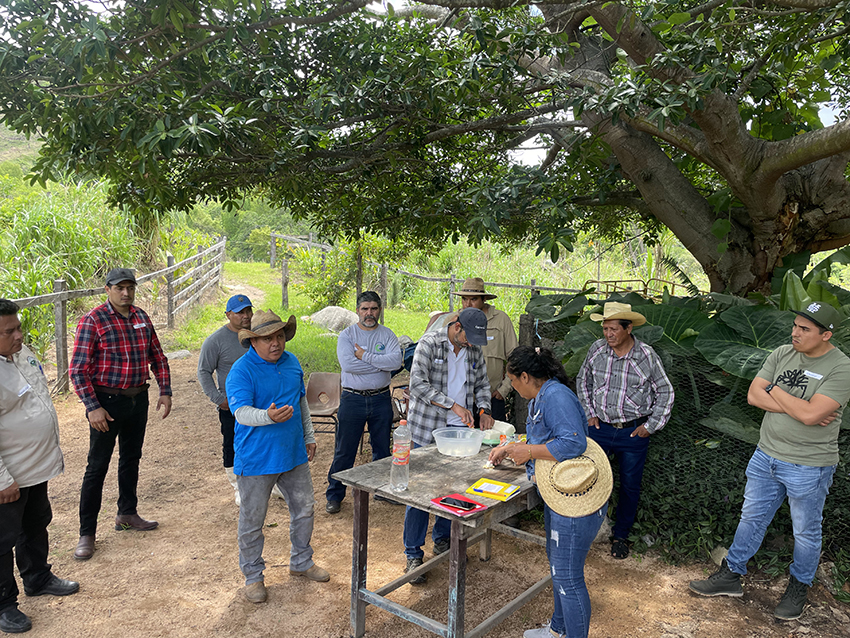
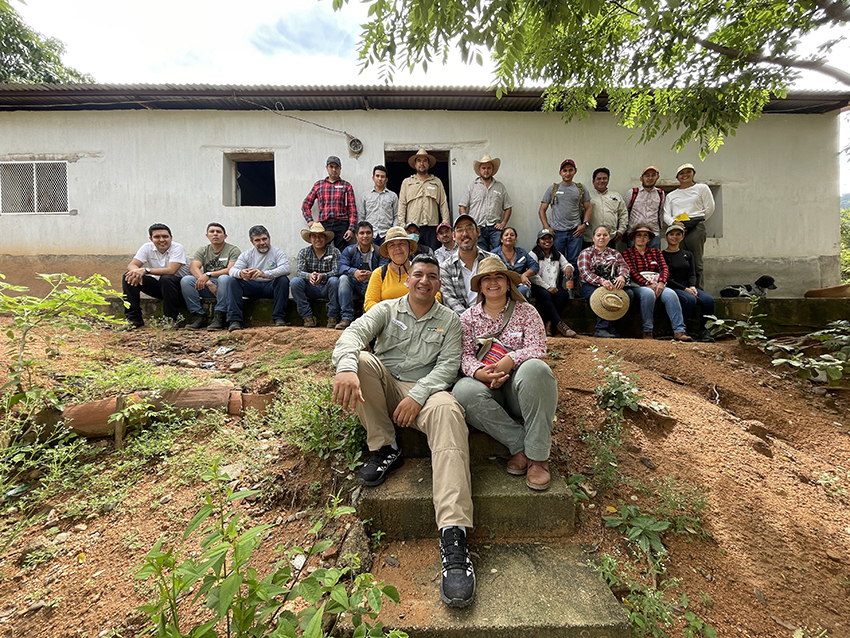
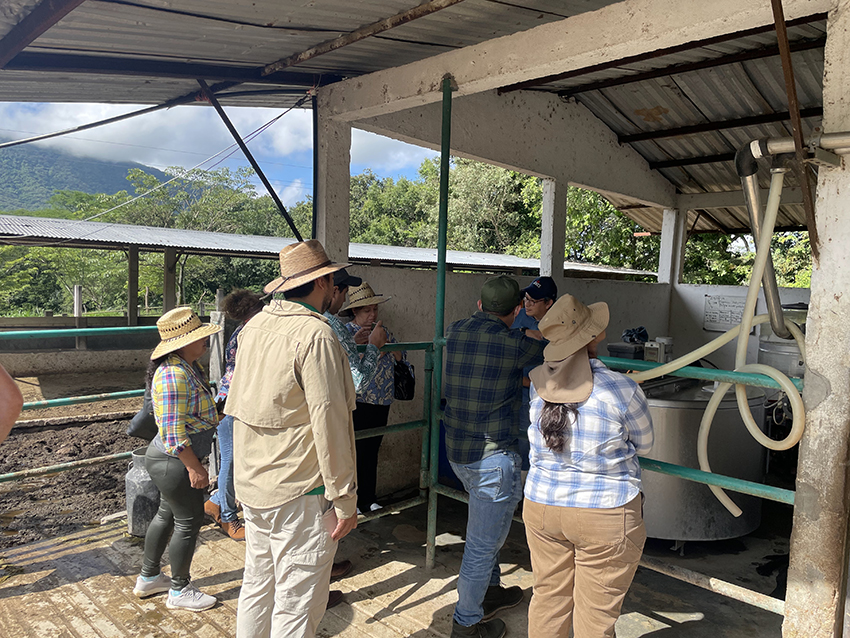
More information/written by:
Juan Edduardo Betanzos Simon
Local Coordinator in Jalisco
BioPaSOS Project
CATIE
juan.betanzos@catie.ac.cr

